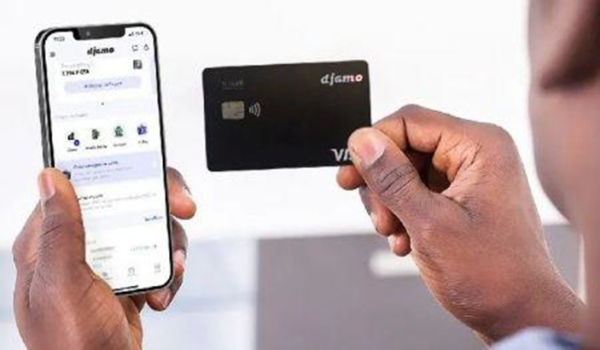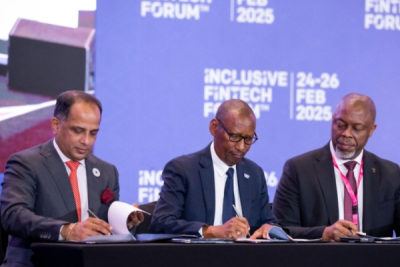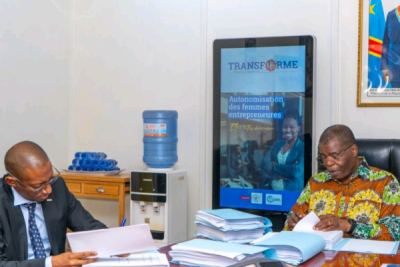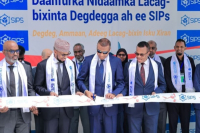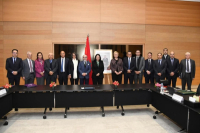
Finance (103)
As fintech adoption continues to grow, companies like Djamo could be instrumental in helping millions transition from cash-based economies to fully digital financial systems, unlocking new economic opportunities and driving financial empowerment across the region.
Ivorian fintech Djamo has secured $17 million in funding to accelerate its expansion across Francophone West Africa. The digital banking platform, which serves over one million customers in Ivory Coast and Senegal, aims to bridge the financial access gap by providing affordable and accessible banking services.
The equity round was led by pan-African, gender-focused VC Janngo Capital, with participation from SANAD Fund for MSMEs, Partech, Oikocredit, Enza Capital, and Y Combinator. The new funding surpasses Djamo’s $14 million Series A in 2022 and signals growing investor confidence in its mission.
Djamo positions itself between mobile money and traditional banks, offering a digital-first banking experience with the flexibility of mobile money but the financial depth of a full bank account. The startup has introduced savings vaults, investment products, salary-linked accounts, and merchant payment tools, strengthening its value proposition.
With its latest funding, Djamo aims to strengthen its footprint in Senegal and expand across other Francophone African countries. As of 2021, 56% of adults in Senegal had an account, exceeding the Sub-Saharan African average of 49%, according to the World Bank. However, the majority (28%) held only mobile money accounts, which lacks advanced financial tools like credit and investments, highlighting the need for more comprehensive financial services.
Djamo’s expansion into Senegal and other Francophone African markets could significantly boost financial inclusion by bridging the gap between mobile money and traditional banking. By offering accessible banking services, Djamo can help transition mobile money users to a more comprehensive financial system, fostering economic empowerment, savings culture, and business growth in the region.
Hikmatu Bilali
African startups have faced a decline in funding in recent years, but there is a growing number of initiatives aimed at helping them secure more investment.
Helios Investment Partners, a UK-based private equity firm, has secured backing from the International Finance Corporation (IFC) and the European Investment Bank (EIB) to launch a $750 million fund focused on technological innovation across Africa.
The fund, dubbed Helios V, aims to invest in 10-12 companies, with average investments ranging from $70 million to $80 million, according to the IFC's project information portal.
The EIB has committed $75 million to Helios V, while the IFC has also invested $75 million and earmarked an additional $50 million for direct co-investments in select portfolio companies.
Helios V will primarily target startups in digital infrastructure, including data centers, fiber optic networks, and telecom towers. The fund will also invest in financial technology and technology-enabled business services, such as cloud solutions, digital health, and logistics.
While the fund is expected to bolster Africa's entrepreneurial landscape, its success hinges on the selection of viable companies and their ability to achieve sustainable growth amid economic volatility.
The launch comes as African startups face a decline in funding. In 2024, they raised $2.2 billion in equity, debt, and grants (excluding exits), according to data from Africa: The Big Deal, a database tracking investments above $100,000. This represents a 25% drop from the $2.9 billion raised in 2023.
By Adoni Conrad Quenum,
Editing by Feriol Bewa
To bolster economic integration across Africa, governments are focusing on establishing a free trade area. This involves the execution of projects designed to streamline trade and cross-border transactions.
The Global Finance & Technology Network (GFTN), an organization founded by the Monetary Authority of Singapore (MAS), has partnered with the central banks of Ghana and Rwanda to launch Africa’s Next-Gen Digital Payment Infrastructure project, also known as "Project 54." The initiative aims to deploy a next-generation digital payment infrastructure, enabling instant, secure, and low-cost cross-border transactions across Africa. The project was unveiled on Tuesday, Feb. 25, at the Inclusive Fintech Forum (IFF) in Kigali.
"As stewards of the financial system, we must remain steadfast in our mission to break down barriers, empower businesses, and create inclusive opportunities for all. Through initiatives like this, we are shaping the future of Africa’s financial landscape," said John Rwangombwa, Governor of the National Bank of Rwanda.
The project aligns with the establishment of the African Continental Free Trade Area (AfCFTA), which seeks to create a single market across the continent. However, high transaction costs and slow fund transfers remain significant obstacles. According to a report by the Institute for Security Studies, remittances to Africa reached approximately $100 billion in 2022. Of this amount, $19.4 billion was transferred within Africa, underscoring the importance of intra-continental financial flows.
Project 54 aims, among other things, to facilitate money transfers between African countries. The initiative is built around three key pillars: a reliable identity infrastructure ensuring secure, verifiable, and universal digital identities to enable seamless financial transactions; an interoperable payment system creating a standardized infrastructure for real-time cross-border transactions within Africa’s financial ecosystem; and a passporting framework for fintech licenses, allowing licensed companies in one of the two participating countries to operate in the other with simplified regulatory requirements. An agreement has already been signed between Ghana and Rwanda to this effect.
In the coming months, project leaders will finalize the roadmap, harmonize regulatory approaches, and launch pilot deployments ahead of large-scale adoption. A tailored pricing model will be introduced to accommodate transactions of varying values, ensuring the system’s financial sustainability. Additionally, regulators, financial institutions, fintech companies, and investors will collaborate to co-create a sustainable digital payment ecosystem.
By Samira Njoya,
Editing by Sèna D. B. de Sodji
It's clear that Tunisia, like the rest of Africa, is moving irreversibly towards a digital economy. The rising popularity of electronic payments is creating a more inclusive, secure, and globally integrated financial landscape.
In 2024, electronic transactions in Tunisia totaled 27.891 billion dinars (approximately $8.8 billion), marking a 10.6% increase compared to the 25.230 billion dinars recorded the previous year. These figures were revealed by the Central Bank of Tunisia (BCT) in its 2024 Payments Bulletin, published on Monday, February 26. The growth reflects the increasing adoption of digital payment solutions, including mobile payments, online transactions, and the wider use of bank cards.
The sector's expansion is also evident in the significant rise in the number of transactions, which grew from 149 million to 163 million, a 9.4% increase in just one year. This momentum is driven by improved digital infrastructure, the rise of fintech companies, and government efforts to promote cashless payments as a means to boost financial inclusion and combat the informal economy.
Mobile Payments: A Key Driver of Digital Transformation
Mobile payments have become a key force behind Tunisia’s digital payment revolution. In 2024, 5.1 million transactions were conducted through electronic wallets, totaling 1.394 billion dinars—an increase of 21.4% compared to the previous year.
Most mobile transactions are concentrated in merchant payments (49.4%), peer-to-peer money transfers (36.6%), and cash deposit and withdrawal operations via e-wallets. This trend highlights the growing adoption of digital payment solutions, fueled by the expansion of active e-wallet accounts, which now number 368,595, managed by 15 payment service providers (PSPs).
Ongoing Modernization of the Payment System
To support this digital shift, the Central Bank of Tunisia is implementing several initiatives aimed at modernizing the payment ecosystem and enhancing transaction security. One key project is the TuniChèque platform, designed to digitize checks—still widely used in Tunisia. By gradually replacing paper checks with more secure electronic versions, this initiative seeks to reduce fraud risks and speed up payment processing.
Additionally, Tunisia is adopting the SWIFT ISO 20022 standard, which harmonizes financial messaging on a global scale. This transition is expected to facilitate the country’s integration into international monetary flows, improve transaction transparency, and enhance communication between banks and businesses.
Another major step is Tunisia’s membership in PAPSS (Pan-African Payment and Settlement System), a continental payment and settlement network. Developed under the auspices of the African Union and the African Export-Import Bank (Afreximbank), PAPSS enables intra-African transactions without relying on foreign currencies such as the dollar or euro. For Tunisia, this means lower costs for cross-border transfers and stronger integration into the African market.
Lastly, the Central Bank plans to extend the Elyssa-RTGS system to cover foreign currency transactions. This project aims to accelerate and secure cross-border payments by enabling real-time settlements, a significant advantage for Tunisian businesses operating internationally.
A Surge in Digital Transactions Across Africa
Tunisia’s digital transformation aligns with a broader trend across Africa, where electronic transactions are experiencing exponential growth. According to the "State of Instant Payments in Africa" report by AfricaNenda, instant payments across the continent reached approximately $1.036 trillion in 2023, with continued growth expected.
This shift is particularly evident in East and West Africa, where mobile payments dominate. Countries like Kenya (with M-Pesa), Ghana, and Nigeria have developed strong digital infrastructures that facilitate seamless transactions. North Africa is now following suit, with fintech innovations and mobile payment solutions on the rise.
The expansion of electronic payments in Africa could have profound economic implications. Greater financial inclusion will enable more citizens to access banking services and participate in the formal economy. Additionally, the digitization of payments enhances fiscal transparency and combats corruption by reducing reliance on cash, which is harder to trace.
However, one of the biggest challenges remains interoperability between different payment systems. Many services currently operate in silos, limiting the fluidity of cross-border transactions. Initiatives like PAPSS and the adoption of international standards are expected to gradually address these barriers, fostering a more interconnected African financial ecosystem.
By Samira Njoya,
Editing by Sèna D. B. de Sodji
The Congolese government wants to accelerate financial inclusion by facilitating access to financial services for all segments of the population. To achieve this, it is relying on digital technologies.
The Democratic Republic of Congo (DRC) is moving to digitize its microfinance sector to accelerate financial inclusion. To this end, it awarded on Friday, February 14, a contract to a consortium comprising PAYCODE FINTECH Congo, BANKTECH Software Services, and Hong Kong Top Wise Communications.
Funded by the government and the World Bank, the initiative involves providing 10,000 electronic payment terminals (EPTs) to microfinance institutions (MFIs) and savings and credit cooperatives (COOPECs). This will enable these institutions to connect to the national electronic payment system of the Central Bank of Congo.
The initiative is part of the Transforme Project, which aims to empower women entrepreneurs and upgrade small and medium-sized enterprises (SMEs) for economic transformation and job creation. According to the National Financial Inclusion Strategy 2023-2028, the financial inclusion rate in the DRC stood at 38.5% at the end of 2022. The Congolese government aims to increase this rate to 65% by 2028.
Microfinance institutions and savings and credit cooperatives are expected to play a key role in achieving this goal. By the end of 2022, the DRC had 78 COOPECs and 15 MFIs. These two types of institutions accounted for 86.1% of the country’s credit establishments (108 total) and 32.4% of all financial institutions (287). Additionally, the credit portfolio grew by 21% in 2022, reaching $283.5 million, up from $234.3 million in 2021 and $168 million in 2020. Savings mobilization increased from $256.97 million in 2020 to $333.76 million in 2022, a growth of approximately 30%.
The effective use of the distributed terminals by microfinance institutions and savings and credit cooperatives will be crucial for adoption. The National Financial Inclusion Strategy highlights that their geographic coverage remains uneven. Kinshasa, North Kivu, and South Kivu provinces alone account for nearly 70% of these institutions.
"Despite their higher number compared to banks, microfinance institutions have fewer operational branches (186) than banks (445) and represent only a small share of the financial sector’s assets, around 3%," the strategy document states.
Isaac K. Kassouwi
Edité par Sèna D. B. de Sodji
The country is steadily moving toward a cashless economy. In recent months, authorities have approved the interoperability of bank cards, followed by that of point-of-sale terminals.
Sierra Leone launched its instant payment service on Thursday, enabling real-time transfers between mobile operators, banks, and mobile money and bank accounts. Currently, seven banks and two mobile money service providers are connected to the system, with full integration deadline set for April 1st for all players.
"Today I have a system that is connected to the banks directly, with interoperability, I am going to shut that system down, that is one more cost removed. When our cost of business is reduced that means we can be able to translate it and give the customer a better service," explained Martison Obeng-Agyei, Managing Director of Afrimoney Sierra Leone (Africell).
David Mansaray, CEO of Orange Money Sierra Leone (Orange), believes the initiative will facilitate access to loans and, in the long run, streamline banking operations and business transactions.
This initiative aligns with the Bank of Sierra Leone’s (BSL) vision to modernize the country’s payment system and build a cashless economy. Following the launch of the national payment switch in April 2023, the central bank successively implemented interoperability for bank cards and then for point-of-sale terminals. The next phase will focus on opening an international payment gateway, allowing Sierra Leonean-issued payment cards to be used abroad.
As of December 31, 2023, Sierra Leone had 8.2 million mobile money accounts, including 1.7 million active accounts, according to central bank data. The country also recorded 22.3 million bank accounts, although the number of individuals holding these accounts was not specified. In 2022, the BSL estimated that 29% of the adult population had an account with a financial institution or a mobile money service provider.
By Isaac K. Kassouwi,
Editing by Sèna D. B. de Sodji
Francophone Africa, with its strong economic potential, is emerging as a key attraction for companies seeking new opportunities. Despite its dynamic and rapidly evolving environment, the region remains largely untapped by international startups.
Startbutton, a pan-African fintech company that enables businesses to expand internationally without physical offices, announced on Friday its expansion into seven new Francophone African countries: Benin, Togo, Senegal, Mali, Burkina Faso, Guinea-Conakry, and Cameroon. This move brings the startup's operations to 15 African markets.
Commenting on the expansion, Startbutton co-founder Malick Bolakale stated: “Francophone Africa maintains strong trade ties with Europe, particularly France, creating unique payment flows and business expansion opportunities. The region is less saturated than Anglophone Africa but holds significant economic potential.” This strategic analysis underpins the company’s decision to target the high-growth potential of the Francophone market.
Startbutton’s expansion aligns with its broader goal of becoming a key infrastructure provider for businesses operating across Africa. With over 300 million people, Francophone Africa represents a strategic destination for companies looking to scale. Currently, Startbutton processes over $5 million per month, generating revenue through transaction fees ranging from 0.5% to 1%. With this expansion, the company expects an additional $2 million in transaction volume from Francophone markets.
Despite ongoing challenges related to cross-border payments and regulatory compliance, Startbutton aims to establish itself as a central player in Africa’s evolving commerce landscape by offering local currency payment solutions while ensuring adherence to local regulations.
This expansion is a major asset for payment companies seeking to enter Francophone Africa without the need for physical offices, reducing operational costs while ensuring regulatory compliance. Startbutton already serves over 100 businesses across 20 countries, primarily in aviation, gaming, and e-commerce, facilitating cross-border growth with tailored payment solutions.
By Samira Njoya,
Editing by Sèna D. B. de Sodji
With the ongoing digital transformation, instant payment systems are emerging as key solutions to ensure fast, secure, and accessible transactions. They are essential for modernizing economies and providing more efficient and inclusive banking services.
Somali Prime Minister Hamza Abdi Barre on Wednesday launched the Somali Instant Payment System (SIPS). Developed jointly by the Central Bank of Somalia (CBS) and the Somali Bankers Association, SIPS is designed to facilitate instant, secure, and transparent transactions between local banks.
“For our country to rebuild, we must support the private sector and investment. We are preparing laws to safeguard people’s finances, prevent terrorist funding, and implement government plans that are central to the security, economy, and development of Somali society” said Hamza Abdi Barre during the launch event.
SIPS serves as a centralized platform connecting the CBS and local private banks, enabling real-time money transfers between financial institutions. The system aims to reduce interbank payment delays, eliminate inefficiencies, and minimize the risks associated with cash transactions, which remain prevalent in the country. Key stakeholders include the CBS, which oversees and regulates the system, and private banks, which act as access points for businesses and individuals.
The launch comes as Somalia pursues economic recovery, seeking to modernize its financial infrastructure and promote the digitization of services. By implementing a modern payment system, the Somali government aims to boost investor confidence, strengthen efforts to combat illicit financial practices, and enhance transparency in financial transactions.
With SIPS, Somalia enters a new economic era. The system is expected to not only improve banking efficiency and enhance the competitiveness of local businesses but also contribute to overall economic growth. It paves the way for inclusive prosperity for Somali citizens and lays the foundation for a resilient and innovative economy.
By Samira Njoya,
Editing by Sèna D. B. de Sodji
The Moroccan government aims to accelerate the development of a national digital economy by 2030. A key focus of this initiative is developing the local startup ecosystem.
The Moroccan Ministry of Digital Transition and Administrative Reform announced on Sunday, January 19, the creation of a new association dedicated to advancing fintech in Morocco. Named the "Morocco Fintech Center" (MFC), this association already comprises around 15 banks and institutions and remains open to other organizations interested in joining.
According to Bank Al-Maghrib (BAM), Morocco's central bank, the MFC is designed to serve as a one-stop shop for fintech companies. It will support their growth through mentorship programs, incubation, acceleration, skill development, and facilitate understanding of the regulatory environment as well as access to financing. Additionally, the MFC aims to foster a collaborative fintech ecosystem that encourages partnerships and networking opportunities while promoting research and development in financial innovation.
In December 2024, Abderrahim Bouazza, Director General of BAM, announced plans to launch a fintech hub in January. This initiative aligns with Morocco's ambition to build a globally competitive local startup ecosystem by implementing specific measures to support the creation, growth, and international expansion of digital startups. This effort falls under the second pillar of the "Digital Morocco 2030" strategy, which focuses on energizing the digital economy.
The initiative is expected to play a crucial role in achieving the government's target of fostering 1,000 certified Moroccan startups by 2026 and 3,000 by 2030, compared to just 380 in 2022. By 2030, the goal is to raise 7 billion dirhams ($696.6 million) for local startups, a significant increase from the 260 million dirhams raised in 2022. Furthermore, the government envisions Morocco having 10 "gazelles" (high-growth startups) and one to two unicorns by 2030.
By Isaac K. Kassouwi,
Editing by Sèna D. B. de Sodji
The traditional postal service model has become obsolete with the rapid digital transformation in recent years. To remain competitive and adapt to this new landscape, Mali's postal service has embarked on a transformation and revitalization strategy.
Mali's postal service operator, La Poste du Mali, plans to launch "Post Wari," a digital financial services platform designed to diversify its operations. This initiative is part of the projects outlined by the Ministry of Communication, Digital Economy, and Administrative Modernization in Government News Bulletin No. 249, published on January 10th. The bulletin reviewed the accomplishments of 2024 and detailed the prospects for 2025.
The "Post Wari" platform will facilitate the issuance and management of electronic money, accessible via mobile (app and SMS) and web platforms (tablets and computers). The ministry stated that this platform is expected to become a one-stop payment gateway for government services in the medium term.
Through this initiative, La Poste du Mali aims to capitalize on the opportunities presented by digital technology amidst the growing adoption of mobile money services. According to the Malian Telecommunications, ICT, and Postal Regulatory Authority (AMRTP), the number of mobile money accounts in the country surged from 6.2 million in 2018 to 16.9 million in 2023—a 172.6% increase. The regulator also highlighted that financial inclusion leaped from 47% in 2016 to 72.3% in 2023, largely driven by mobile technology, which now accounts for 55.9% of financial inclusion efforts.
While "Post Wari" has been announced as part of the 2025 outlook, no further details have been provided regarding its launch date or the current stage of development. Furthermore, La Poste du Mali will face stiff competition in a market dominated by telecom operators like Orange. By the end of 2023, Orange Money had 13.1 million subscribers, commanding a 78% market share, according to official statistics.
By Isaac K. Kassouwi
Editing by Sèna D. B. de Sodji
More...
Mobile wallets are rapidly gaining popularity in Africa, offering a viable alternative to traditional banking services for a significant portion of the population that lacks access to them. These digital wallets are particularly useful for facilitating money transfers, especially international remittances.
Singapore-based cross-border payment company Tranglo announced on Monday, December 16, the addition of 10 new African countries to its payment network. This expansion increases its coverage on the continent to 25 countries, providing an additional option for international remittances to Africa.
The newly covered countries include Benin, Cameroon, the Democratic Republic of Congo (DRC), The Gambia, Guinea, Guinea-Bissau, Ivory Coast, Malawi, Rwanda, and Tanzania. At launch, all new markets will support peer-to-peer electronic wallet transactions, enabling near-instant transfers in local currencies.
This move comes amid a surge in mobile money adoption across Africa. According to the GSMA’s State of the Industry Report on Mobile Money 2024, mobile money subscriptions grew by 19% between 2022 and 2023, reaching 856 million. Total transactions increased by 28% to 62 billion, while the value of these transactions rose by 12% to $919 billion.
The growth of mobile money has made international remittances more accessible, which are "essential for many African families, helping them address urgent challenges such as food insecurity, drought, supply chain disruptions, flooding, and debt servicing," the GSMA notes. In 2023, international remittances and merchant payments saw the highest growth in usage, with mobile money remittances reaching $29 billion—a 23% year-on-year increase. According to the World Bank, total international transfers to Africa amounted to $90.2 billion.
However, Tranglo's solution will face increasing competition, particularly from telecom operators. For instance, Safaricom’s M-Pesa platform is ramping up efforts to expand its acceptance of international transfers from an ever-growing number of countries.
By Isaac K. Kassouwi,
Editing by Sèna D. B. de Sodji
Since 2019, the startup has undertaken numerous financial operations to enhance its technology and accelerate growth. The company has announced the successful completion of a new funding round, elevating its status to that of a unicorn.
South African fintech startup Tyme has achieved unicorn status a designation for startups valued at over $1 billion following a valuation of $1.5 billion after successfully completing a $250 million funding round led by Brazilian neobank Nubank, it announced on Tuesday, December 17.
“Nubank transformed financial services in Brazil. We are excited by the value that Nubank's thought partnership and advice can bring to Tyme, particularly in areas such as data analytics, credit risk management, product development and marketing - levers we believe are key to achieving leadership in our markets,” said Coen Jonker, CEO and co-founder of Tyme Group.
Despite a slowdown in investments in African startups, Tyme has become the second startup to reach unicorn status this year, following Nigerian fintech Moniepoint. The company’s rise to unicorn status was driven by successive funding rounds since 2019, including $79 million in June 2019, $110 million in February 2021, $70 million in December 2021, and $78 million in May 2023.
Tyme is now the ninth African unicorn, joining fintech peers Interswitch, Flutterwave, Opay, Chipper Cash, Wave, MNT-Halan, Moniepoint, and edtech startup Andela. Notably, e-commerce platform Jumia, the continent’s first unicorn in 2016, and fintech Fawry lost their unicorn status after going public in 2019.
By Adoni Conrad Quenum,
Editing by Feriol Bewa
The initiative is part of NamPost’s digital transformation program. Called “Project Sky,” it aims to enhance the organization's operational efficiency, optimize the customer experience, and promote financial inclusion.
NamPost, Namibia's national postal operator, launched a mobile app and online banking services last week to expand access to its financial services. Customers of the state-owned enterprise can now check balances, make payments, and transfer funds electronically from their smartphones or any internet-enabled device without visiting a post office.
“The MyNamPost Banking App and Internet Banking are not just technological upgrades—they represent a commitment to bringing modern financial services to the people of Namibia, wherever they are. Our customers now have more control over their finances with digital tools that are simple, affordable, and convenient,” said Festus Hangula, NamPost’s Managing Director.
Emma Theofelus, Namibia’s Minister of Information and Communication Technology, acknowledged that innovative platforms like NamPost’s are crucial for financial inclusion. According to the World Bank, 71.35% of Namibians over the age of 15 had an account with a financial institution or mobile money provider in 2021, out of an estimated population of 2.5 million. However, she emphasized the need to equip all citizens “with the necessary skills to take advantage” of these services, noting the limited access to smartphones and the internet.
The International Telecommunication Union (ITU) reports that 79.6% of the Namibian population owns a mobile phone. Although the proportion of smartphone users is not specified, the ITU indicates that internet penetration in Namibia stands at 62.2%, with 63.2% of households having internet access at home.
However, the cost of internet access in Namibia remains relatively high compared to ITU standards, which recommend costs below or equal to 2% of gross national income (GNI) per capita. Namibians currently spend 2.6% of their GNI on mobile internet and 8.7% for fixed internet. According to the World Bank, Namibia’s GNI per capita was $12,170 in 2023.
Isaac K. Kassouwi
Last July, TerraPay raised $95 million to expand digital payments across the continent. The company continues its efforts by involving African stakeholders in its initiatives.
British payment solutions provider TerraPay has partnered with several mobile money operators, including Africa's Mpesa and Sama Money, to create the Wallet Interoperability Council, announces a press release dated August 20.
With that council, the British firm aims to interconnect mobile money operators to facilitate cross-border payments and fund transfers.
“This initiative addresses real market challenges and has the potential to reshape perceptions around wallet usage for cross border commerce; thus, enabling easy access for interoperability within the council's wallet participants globally,” said Sekou Kane Diallo, Deputy CEO and CIO of Sama Money.
The launch of this association comes at a time when mobile money solutions are rapidly expanding across the continent. According to the "State of the Industry Report on Mobile Money 2024" by the GSM Association (GSMA), the value of mobile money transactions in Sub-Saharan Africa reached a staggering $912 billion in 2023, a 22% increase from the previous year. The same report shows that Africa accounts for 835 million of the 1.75 billion registered mobile money accounts worldwide, representing 47.7% of the accounts.
Adoni Conrad Quenum


